
(New York=Yonhap Infomax) Jin Woo Choi – "The President always wants both supporters and opponents in the room to debate," said Kevin Hassett, Chairman of the National Economic Council (NEC) and a key economic advisor to U.S. President Donald Trump.
Hassett made these remarks in response to a question from David Rubenstein, Co-Chairman of The Carlyle Group, at the Washington Forum on the 12th. Even a private equity titan like Rubenstein expressed curiosity about how President Trump formulates policy.
This is understandable, as President Trump is widely seen as a single-minded leader, often pushing ahead with what he believes is right.
According to Hassett, routine matters are typically handled by Cabinet members. "If Cabinet members want to know the President's view on day-to-day issues, I can often provide guidance, saying, 'He told me six months ago that this approach is fine,'" Hassett explained.
However, for major issues, "We hold meetings in the Roosevelt Room, where key officials discuss which options to present to the President," Hassett said. "Then, designated supporters and opponents enter the Oval Office to debate with the President."
Hassett emphasized, "If an issue is not unanimously supported, the President wants a vigorous debate in the Oval Office. If there isn't enough argument, he will provoke it himself."
However, this does not necessarily mean President Trump is democratic in the sense of always listening to dissenting views. He is fundamentally seen as a debate-driven leader. During his first term, Trump reportedly staged 'cage fights' between then-Treasury Secretary Steven Mnuchin and White House Trade and Manufacturing Policy Director Peter Navarro. A Fox News article on May 17, 2018, described this as an "internal war over tariff strategy." Trump is said to value the confidence of those making their case.
Hassett also noted that President Trump is less impulsive than many believe. "After debates, the President sometimes says, 'I'll sleep on it,' and does not always make immediate decisions," Hassett said.
Rubenstein followed up with a provocative question: "After everyone leaves, does someone whisper in the President's ear, saying, 'This is what you should do'?" This alludes to the so-called "recency effect," where people tend to remember the first and last things they hear, and after a debate, the brain may treat the last comment as a conclusion.
Hassett acknowledged, "This is a risk present in every administration," adding, "There is even competition to see who can call the President before he goes to sleep." He continued, "Every president faces this issue, but this administration has managed the risk much better than previous ones," crediting Chief of Staff Susie Wiles for handling it effectively.
Hassett also stated that President Trump does not rely solely on the opinions of the White House or Cabinet. "He has an extremely broad social network," Hassett said. "Whatever the issue, he probably knows someone who has studied it for a lifetime."
For example, when staff enter the Oval Office and say, "We think this is the right approach," Trump sometimes replies, "I want to think about it." He is then known to call people outside his staff for additional input.
Hassett added that lobbying is largely ineffective with President Trump. "Lobbyists won't like to hear this, but the President really cares about doing the right thing," he said, adding, "The chances of success are very small."
"When we make important decisions affecting a major industry, if you know a lot about that industry, we will listen to your opinion. That's it," Hassett said, noting that he himself avoids direct involvement with lobbyists.
jwchoi@yna.co.kr
(End)
Copyright © Yonhap Infomax Unauthorized reproduction and redistribution prohibited.

